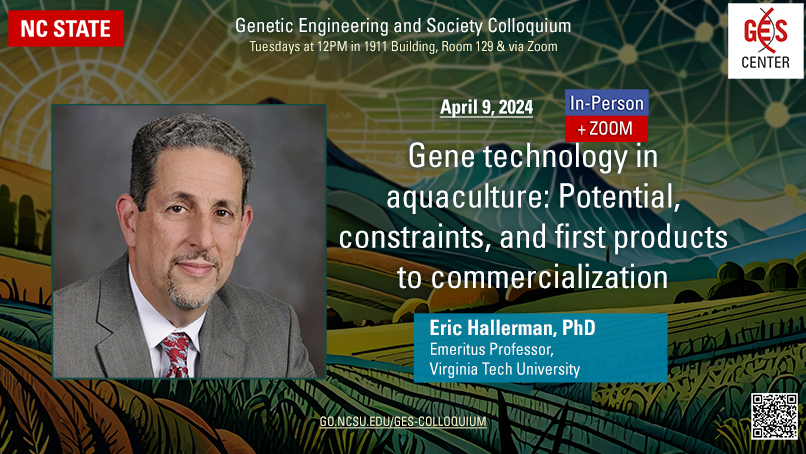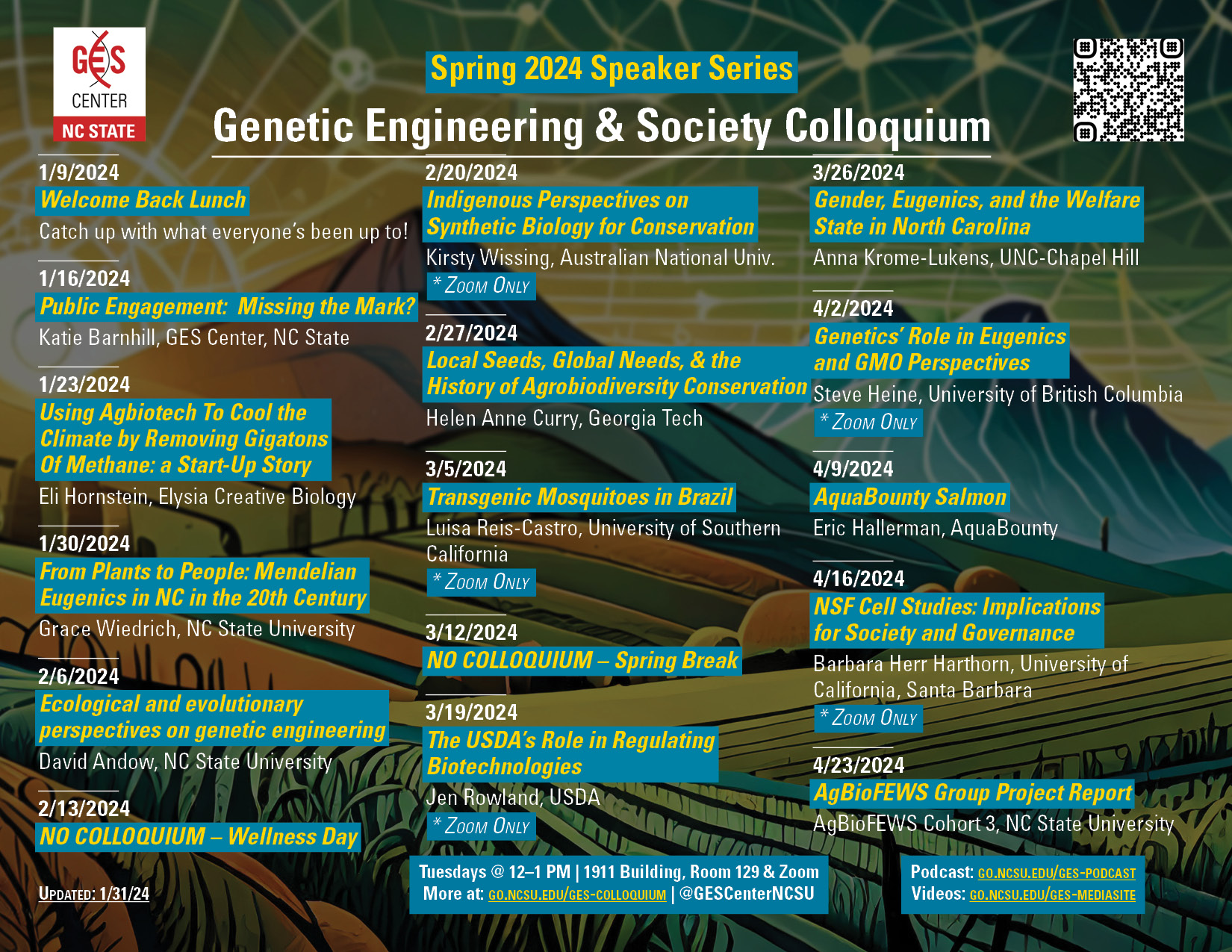
- This event has passed.
Eric Hallerman – Gene Technology in Aquaculture | GES Colloquium

Colloquium Home | Zoom Registration | GES Video Library (current) | Video Archives | Podcast | @GESCenterNCSU | Newsletter
Gene technology in aquaculture: Potential, constraints, and first products to commercialization  +
+ 
Eric Hallerman, PhD, Emeritus Professor, Department of Fish and Wildlife Conservation, Virginia Tech University
While aquaculture biotechnology has the potential to improve the sustainability of aquaculture, its realization will depend upon enabling public policy.
Download seminar poster
Abstract
Aquaculture products are important to human nutrition, especially in developing countries. To meet growing global demand, aquaculture must improve production systems and farmed stocks, the latter using both selective breeding and gene technology. Fishes are excellent systems for gene technology, and numerous transgenic and gene-edited lines have been developed. While there has been considerable R&D, there has been little penetration of the marketplace. The reasons for this will be considered, with a case study focusing on the development and regulatory oversight of the AquAdvantage Atlantic salmon, the first genetically modified animal approved for use as food globally. Two gene-edited marine fishes have been approved for sale in Japan.
Will other animal products of gene technology be approved? To realize the benefits of animal biotechnology, we will need not just innovation, but also enabling regulation creating a pathway to the market, and engagement with the private and NGO sectors and the public.
Related links:
- Heritable Genetic Modification in Food Animals, NASEM
- SAAA Animal Biotechnology Resources: https://www.isaaa.org/kc/proceedings/animalbiotechnology
- Hallerman, E., J. Bredlau, L.S. Camargo, et al. 2024. Enabling regulatory policy globally will promote realization of the potential of animal biotechnology. CABI Agriculture and Life Sciences, 5: 25. https://doi.org/10.1186/s43170-024-00221-6. PDF
Speaker Bio
Eric Hallerman is a recently retired Professor of Fish Conservation at Virginia Tech University and is currently serving as the Chair of the ad hoc committee appointed by the National Academies to explore heritable genetic modifications of food animals. His research has included conservation genetics of fishes and mollusks, aquaculture genetics, and aquaculture biotechnology and policy. He has done research on gene transfer in fish, effective confinement of aquaculture species, ecological risk assessment for genetically modified fish, and related public policies. He has done such work with the U.S. Department of Agriculture, the U.S. Food and Drug Administration, the Food and Agriculture Organization of the United Nations, and several NGOs. He has served on several committees of the National Academy of Sciences with mandates in these areas and organized several international workshops on animal biotechnology policy.
GES Colloquium is jointly taught by Drs. Jen Baltzegar and Dawn Rodriguez-Ward, who you may contact with any class-specific questions. Colloquium will be held in person in the 1911 Building, room 129, and live-streamed via Zoom.
Please subscribe to the GES newsletter and LinkedIn for updates.
WordPress database error: [Unknown column 'wp_tec_occurrences.start_date' in 'SELECT']SELECT SQL_CALC_FOUND_ROWS wp_posts.*, CAST( wp_tec_occurrences.start_date AS DATETIME ) AS event_date
FROM wp_posts LEFT JOIN wp_term_relationships ON (wp_posts.ID = wp_term_relationships.object_id) LEFT JOIN wp_postmeta ON ( wp_posts.ID = wp_postmeta.post_id AND wp_postmeta.meta_key = '_EventHideFromUpcoming' ) LEFT JOIN wp_postmeta AS mt1 ON ( wp_posts.ID = mt1.post_id )
WHERE 1=1 AND wp_posts.ID NOT IN (19512) AND (
wp_term_relationships.term_taxonomy_id IN (149,521,802)
OR
wp_term_relationships.term_taxonomy_id IN (45,47)
) AND (
wp_postmeta.post_id IS NULL
AND
( mt1.meta_key = '_EventStartDate' AND CAST(mt1.meta_value AS DATETIME) >= '2026-02-21 14:36:14' )
) AND wp_posts.post_type IN ('post', 'page', 'attachment', 'tribe_venue', 'tribe_events', 'tribe_event_series') AND ((wp_posts.post_status = 'publish'))
GROUP BY wp_tec_occurrences.occurrence_id
ORDER BY event_date ASC, wp_posts.post_date ASC
LIMIT 0, 3
